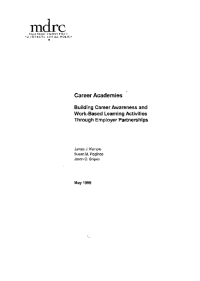Career Academies: Employer Partnerships
This is the third in a series of reports from an ongoing evaluation of the Career Academy approach, a widely established high school reform initiative aimed at improving students’ performance in high school and providing them with clearer pathways to post-secondary education and careers. The evaluation is being conducted by MDRC with support from the U.S. Departments of Education and Labor and a group of private foundations. It focuses on 10 Career Academies across the country. Career Academies share three basic features. First, the programs are typically organized as schools-within-schools in an effort to create more supportive teaching and learning communities. Second, they have a career theme and attempt to integrate a college preparatory academic curriculum with more applied, occupation-related courses. Third, they establish partnerships with local employers as a means of increasing students’ awareness of career options in a given field and providing them with learning opportunities in a work setting.
This report focuses on the third of these features, the employer partnerships and how they evolved in each of the 10 participating Career Academies. It also assesses the extent to which Career Academies increased student participation in various career awareness and work-based learning activities that were sponsored by the employer partners. The findings presented in this report provide insights into the opportunities and challenges that high schools and local employers face as they seek to build constructive partnerships. The report suggests several lessons that can guide the development of employer partnerships and work-related learning opportunities for students in the context of Career Academies or other school-to-work programs.







